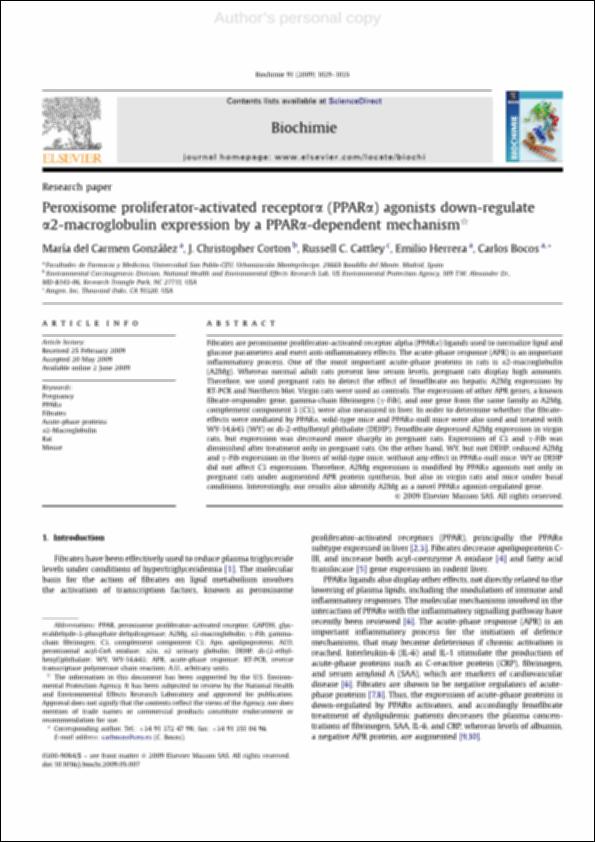Por favor, use este identificador para citar o enlazar este ítem:
http://hdl.handle.net/10637/2879Peroxisome proliferator-activated recptor-a (PPAR-a) agonists down-regulate 2-macriglobulin expresion by PPAR-dependent mechanism.
| Título : | Peroxisome proliferator-activated recptor-a (PPAR-a) agonists down-regulate 2-macriglobulin expresion by PPAR-dependent mechanism. |
| Autor : | González, María del Carmen Corton, J. Christopher Cattley, Russell C. Herrera Castillón, Emilio. Bocos de Prada, Carlos |
| Materias: | Pregnancy; PPARa; Fibrates; Acute-phase proteins; a2-Macroglobulin |
| Resumen : | Fibrates are peroxisome proliferator-activated receptor alpha (PPARa) ligands used to normalize lipid and
glucose parameters and exert anti-inflammatory effects. The acute-phase response (APR) is an important
inflammatory process. One of the most important acute-phase proteins in rats is a2-macroglobulin
(A2Mg). Whereas normal adult rats present low serum levels, pregnant rats display high amounts.
Therefore, we used pregnant rats to detect the effect of fenofibrate on hepatic A2Mg expression by
RT-PCR and Northern blot. Virgin rats were used as controls. The expression of other APR genes, a known
fibrate-responder gene, gamma-chain fibrinogen (g-Fib), and one gene from the same family as A2Mg,
complement component 3 (C3), were also measured in liver. In order to determine whether the fibrateeffects
were mediated by PPARa, wild-type mice and PPARa-null mice were also used and treated with
WY-14,643 (WY) or di-2-ethylhexyl phthalate (DEHP). Fenofibrate depressed A2Mg expression in virgin
rats, but expression was decreased more sharply in pregnant rats. Expression of C3 and g-Fib was
diminished after treatment only in pregnant rats. On the other hand, WY, but not DEHP, reduced A2Mg
and g-Fib expression in the livers of wild-type mice, without any effect in PPARa-null mice. WY or DEHP
did not affect C3 expression. Therefore, A2Mg expression is modified by PPARa agonists not only in
pregnant rats under augmented APR protein synthesis, but also in virgin rats and mice under basal
conditions. Interestingly, our results also identify A2Mg as a novel PPARa agonist-regulated gene. Fibrates are peroxisome proliferator-activated receptor alpha (PPARa) ligands used to normalize lipid and glucose parameters and exert anti-inflammatory effects. The acute-phase response (APR) is an important inflammatory process. One of the most important acute-phase proteins in rats is a2-macroglobulin (A2Mg). Whereas normal adult rats present low serum levels, pregnant rats display high amounts. Therefore, we used pregnant rats to detect the effect of fenofibrate on hepatic A2Mg expression by RT-PCR and Northern blot. Virgin rats were used as controls. The expression of other APR genes, a known fibrate-responder gene, gamma-chain fibrinogen (g-Fib), and one gene from the same family as A2Mg, complement component 3 (C3), were also measured in liver. In order to determine whether the fibrateeffects were mediated by PPARa, wild-type mice and PPARa-null mice were also used and treated with WY-14,643 (WY) or di-2-ethylhexyl phthalate (DEHP). Fenofibrate depressed A2Mg expression in virgin rats, but expression was decreased more sharply in pregnant rats. Expression of C3 and g-Fib was diminished after treatment only in pregnant rats. On the other hand, WY, but not DEHP, reduced A2Mg and g-Fib expression in the livers of wild-type mice, without any effect in PPARa-null mice. WY or DEHP did not affect C3 expression. Therefore, A2Mg expression is modified by PPARa agonists not only in pregnant rats under augmented APR protein synthesis, but also in virgin rats and mice under basal conditions. Interestingly, our results also identify A2Mg as a novel PPARa agonist-regulated gene. |
| Descripción : | En: Biochimie. 2009. v. 91 : 1029-1035 p. ISSN. 0300-9084 |
| URI : | http://hdl.handle.net/10637/2879 |
| Derechos: | http://creativecommons.org/licenses/by-nc-nd/4.0/deed.es |
| Fecha de publicación : | 19-sep-2009 |
| Centro : | Universidad San Pablo-CEU |
| Aparece en las colecciones: | Facultad de Farmacia |
Los ítems de DSpace están protegidos por copyright, con todos los derechos reservados, a menos que se indique lo contrario.


